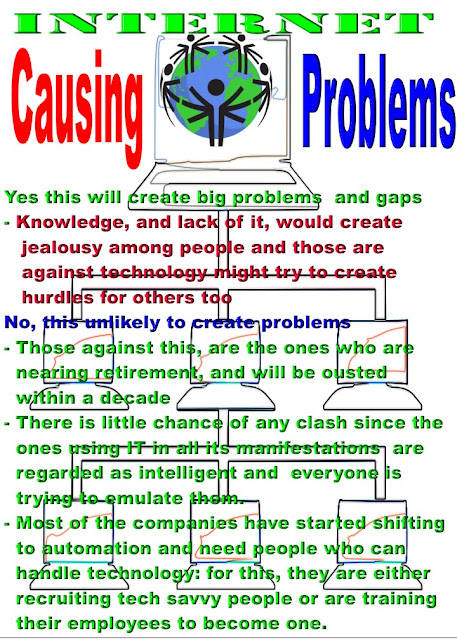The age of Information Technology has taken a lot of people by surprise. While it has become a way of life for some, others know very little about it and may be unlikely to learn. Eventually we will have a polarized society and this will lead to serious social problems. To what extent do you agree with this statement?
Yes this will create big problems (assumption) and gaps
Knowledge, and lack of it, would create jealousy among people and those are against technology might try to create hurdles for others too
No, this unlikely to create big problems (assumption) and gaps
Those against this, are the ones who are nearing retirement, and will be ousted within a decade
There is little chance of any clash since the ones using IT in all its manifestations are regarded as intelligent and everyone is trying to emulate them.
Most of the companies have started shifting to automation and need people who can handle technology: for this, they are either recruiting tech savvy people or are training their employees to become one.
The proliferation/spread of information technology has happened at a startling/an alarming pace, and left a sizable proportion of population miles behind. Several lobbies fear that since this gap might never be bridged, it could cause social discord in society. However, this notion can be challenged on various grounds.
To start with, the assumption and theory of friction among sections that are familiar and those strangers to this revolution, are floated/created by certain critics who fear that this might create jealousy in those who are not accustomed/used to this technology, and they could erect hurdles for the other sections, leading to a feeling of mistrust. This section cites/quotes certain rare events to prove their point, such as it has been infrequently observed that senior members of the workforce, who are alien to computers, in some organisations refuse to cooperate and work with their younger tech savvy colleagues, affecting interpersonal relationships and eventually the productivity.
Having said that, such a pessimistic view can be easily proven wrong/quashed by delving deeper into the reality. Those found rejecting this technology and its application are the ones who are nearing retirement and will be replaced by their younger counterparts who can interact with IT and its various manifestations effortlessly and effectively, ruling out any possibility of conflicts. Furthermore, the current recruitment criteria are based on the ability to handle this modern introduction efficiently, and even existing staff is being trained to familiarise them with this new invention. Such factors blur any possibility of society falling apart, owing to ability or inability to handle information technology.
Overall, I strongly dissent with this notion and feel that the day is not far when everyone will become acclimatized with various forms of this new innovation, leaving hardly anyone out of the ambit of this development.


